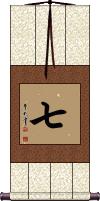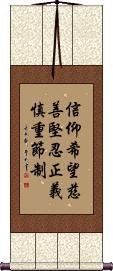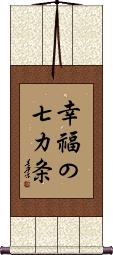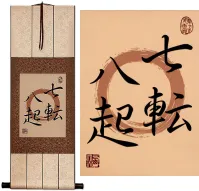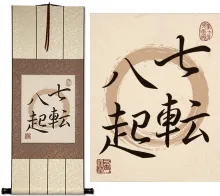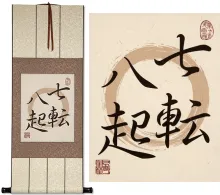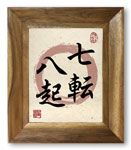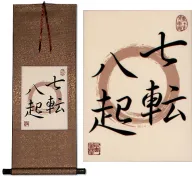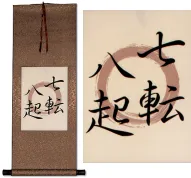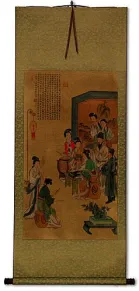Many custom options...
And formats...

Seven in Chinese / Japanese...
Buy a Seven calligraphy wall scroll here!
Personalize your custom “Seven” project by clicking the button next to your favorite “Seven” title below...
Seven
The number seven
七 is the number 7 in Chinese, Korean Hanja, and Japanese Kanji. I have no idea why you would want this as a calligraphy wall scroll but hundreds of visitors search for this number.
In Japanese, this character can be pronounced several different ways depending on context. It can be shichi / nana-, and a few others when combined with other characters.
There's just one way to pronounce this in Chinese. Korean also has just one pronunciation.
Seven Emperors Judo
Nana tei jūdō
Seven Heavenly Virtues
信仰希望慈善堅忍正義慎重節制 is a list in Chinese and Japanese Kanji of an interpretation of the Seven Heavenly Virtues.
1. Faith is belief in God, and the right virtues.
2. Hope is taking a positive future view that good will prevail.
3. Charity is a concern for, and active helping of, others.
4. Fortitude is never giving up.
5. Justice is being fair and equitable with others.
6. Prudence is care of and moderation with money.
7. Temperance is moderation of needed things and abstinence from things that are not needed.
The full list is here. 信仰希望慈善堅忍正義慎重節制 is a word list, not a common phrase. While all Chinese and Japanese people will recognize the words in the list, they may not understand what the list is about (unless they are familiar with the Seven Heavenly Virtues).
don’t get this as a tattoo or anything like that without first consulting a native translator in the target language. These are fine for a wall scroll but a long discussion is needed before you commit to this for a lifetime inking commitment.
Seven Rules of Happiness
幸福の七カ条 is the title for the 7 rules of happiness in Japanese.
The rules themselves take up a lot of space:
1. 成功や栄誉や勝ち負けを目的に、ことを行ってはいけない。
2. しないではいられないことをし続けなさい。
3. 他人との比較ではない、あくまで自分の楽しさを追及すべし。
4. 好きの力を信じる。
5. 才能と収入は別、努力は人を裏切ると心得よ。
6. 怠け者になりなさい。
7. 目に見えない世界を信じる。
...so this title is probably all you need.
Note: Because this selection contains some special Japanese Katakana characters, it should be written by a Japanese calligrapher.
Fall Down Seven Times, Get Up Eight
Always rising after a fall or repeated failures
七転八起 is a Japanese proverb that relays the vicissitudes of life, with the meaning “seven times down eight times up.”
Some would more naturally translate it into English as “Always rising after a fall or repeated failures” or compare it to the English, “If at first, you don't succeed, try, try again.”
The first Kanji is literally “7.” The second means “fall down” (sometimes this Kanji means “turn around,” “revolve” or “turn over” but in this case, it holds the meaning of “fall”). The third is “8.” And the last is “get up,” “rouse,” or “rise.”
Basically, if you fail 7 times, you should recover from those events and be prepared to rise an 8th time. This also applies if it is the world or circumstances that knock you down seven times...
...just remember that you have the ability to bounce back from any kind of adversity.
Note: This can be pronounced in two ways. One is “shichi ten hakki” or “shichitenhakki.” The other is “nana korobi ya oki” also written, “nanakorobi-yaoki.”
Special Note: The second character is a Kanji that is not used in China. Therefore, please select a Japanese calligrapher for this title.
This in-stock artwork might be what you are looking for, and ships right away...
Gallery Price: $100.00
Your Price: $49.88
Gallery Price: $100.00
Your Price: $58.88
Gallery Price: $100.00
Your Price: $58.88
Gallery Price: $162.00
Your Price: $89.88
Gallery Price: $162.00
Your Price: $89.88
Gallery Price: $100.00
Your Price: $39.88
Gallery Price: $100.00
Your Price: $39.88
Gallery Price: $222.00
Your Price: $122.88
Gallery Price: $200.00
Your Price: $79.88
Not the results for Seven that you were looking for?
Below are some entries from our dictionary that may match your Seven search...
| Characters If shown, 2nd row is Simp. Chinese |
Pronunciation Romanization |
Simple Dictionary Definition |
七 see styles |
qī qi1 ch`i chi nano なの |
More info & calligraphy: Seven(numeric) seven (chi: qī); (female given name) Nano sapta, seven. |
佛 see styles |
fú fu2 fu hotoke ほとけ |
More info & calligraphy: Buddhism / Buddha(surname) Hotoke Buddha, from budh to "be aware of", "conceive", "observe", "wake"; also 佛陀; 浮圖; 浮陀; 浮頭; 浮塔; 勃陀; 勃馱; 沒馱; 母馱; 母陀; 部陀; 休屠. Buddha means "completely conscious, enlightened", and came to mean the enlightener. he Chinese translation is 覺 to perceive, aware, awake; and 智 gnosis, knowledge. There is an Eternal Buddha, see e.g. the Lotus Sutra, cap. 16, and multitudes of Buddhas, but the personality of a Supreme Buddha, an Ādi-Buddha, is not defined. Buddha is in and through all things, and some schools are definitely Pan-Buddhist in the pantheistic sense. In the triratna 三寳 commonly known as 三寳佛, while Śākyamuni Buddha is the first "person" of the Trinity, his Law the second, and the Order the third, all three by some are accounted as manifestations of the All-Buddha. As Śākyamuni, the title indicates him as the last of the line of Buddhas who have appeared in this world, Maitreya is to be the next. As such he is the one who has achieved enlightenment, having discovered the essential evil of existence (some say mundane existence, others all existence), and the way of deliverance from the constant round of reincarnations; this way is through the moral life into nirvana, by means of self-abnegation, the monastic life, and meditation. By this method a Buddha, or enlightened one, himself obtains Supreme Enlightenment, or Omniscience, and according to Māhāyanism leads all beings into the same enlightenment. He sees things not as they seem in their phenomenal but in their noumenal aspects, as they really are. The term is also applied to those who understand the chain of causality (twelve nidānas) and have attained enlightenment surpassing that of the arhat. Four types of the Buddha are referred to: (1) 三藏佛the Buddha of the Tripiṭaka who attained enlightenment on the bare ground under the bodhi-tree; (2) 通佛the Buddha on the deva robe under the bodhi-tree of the seven precious things; (3) 別佛the Buddha on the great precious Lotus throne under the Lotus realm bodhi-tree; and (4) 圓佛the Buddha on the throne of Space in the realm of eternal rest and glory where he is Vairocana. The Hīnayāna only admits the existence of one Buddha at a time; Mahāyāna claims the existence of many Buddhas at one and the same time, as many Buddhas as there are Buddha-universes, which are infinite in number. |
律 see styles |
lǜ lu:4 lü ritsuji りつじ |
More info & calligraphy: Ritsu(1) law (esp. ancient East Asian criminal code); regulation; (2) {Buddh} vinaya (rules for the monastic community); (3) (abbreviation) (See 律宗) Ritsu (school of Buddhism); (4) (abbreviation) (See 律詩) lüshi (style of Chinese poem); (5) (also りち) (musical) pitch; (6) (See 十二律,呂・2) six odd-numbered notes of the ancient chromatic scale; (7) (abbreviation) (See 律旋) Japanese seven-tone gagaku scale, similar to Dorian mode (corresponding to: re, mi, fa, so, la, ti, do); (n,n-suf,ctr) (8) step (in traditional Eastern music, corresponding to a Western semitone); (personal name) Ritsuji vinaya, from vi-ni, to 1ead, train: discipline: v. 毘奈耶; other names are Prātimokṣa, śīla, and upalakṣa. The discipline, or monastic rules; one of the three divisions of the Canon, or Tripiṭaka, and said to have been compiled by Upāli. |
馬 马 see styles |
mǎ ma3 ma me め |
More info & calligraphy: Horse(1) horse; (2) (See 競馬) horse racing; (3) (abbreviation) {shogi} (See 竜馬・2) promoted bishop; (4) {cards} knight (court card in mekuri karuta and unsun karuta); (surname) Me aśva, a horse; a stallion; one of the seven treasures of a sovereign. |
布施 see styles |
bù shī bu4 shi1 pu shih fuho ふほ |
More info & calligraphy: Dana: Almsgiving and Generosity(n,vs,vi) (1) {Buddh} alms-giving; charity; (n,vs,vi) (2) {Buddh} offerings (usu. money) to a priest (for reading sutras, etc.); (surname) Fuho dāna 檀那; the sixth pāramitā, almsgiving, i. e. of goods, or the doctrine, with resultant benefits now and also hereafter in the forms of reincarnation, as neglect or refusal will produce the opposite consequences. The 二種布施 two kinds of dāna are the pure, or unsullied charity, which looks for no reward here but only hereafter; and the sullied almsgiving whose object is personal benefit. The three kinds of dāna are goods, the doctrine, and courage, or fearlessness. The four kinds are pens to write the sutras, ink, the sutras themselves, and preaching. The five kinds are giving to those who have come from a distance, those who are going to a distance, the sick, the hungry, those wise in the doctrine. The seven kinds are giving to visitors, travellers, the sick, their nurses, monasteries, endowments for the sustenance of monks or nuns, and clothing and food according to season. The eight kinds are giving to those who come for aid, giving for fear (of evil), return for kindness received, anticipating gifts in return, continuing the parental example of giving, giving in hope of rebirth in a particular heaven, in hope of an honoured name, for the adornment of the heart and life. 倶舍論 18. |
忍法 see styles |
rěn fǎ ren3 fa3 jen fa ninpou / ninpo にんぽう |
More info & calligraphy: Ninpo(忍法位) The method or stage of patience, the sixth of the seven stages of the Hīnayāna in the attainment of arhatship, or sainthood: also the third of the four roots of goodness. |
朱雀 see styles |
zhū què zhu1 que4 chu ch`üeh chu chüeh sujiyaku すじやく |
More info & calligraphy: Suzaku(1) (See 四神) Vermilion Bird (god said to rule over the southern heavens); (2) {astron} (See 二十八宿) seven mansions (Chinese constellations) of the southern heavens; (surname) Sujiyaku red bird |
海德 see styles |
hǎi dé hai3 de2 hai te kaitoku |
More info & calligraphy: HeidThe eight virtues, or powers of the ocean, i.e. vastness, tidal regularity, throwing out of the dead, containing the seven kinds of pearls, absorption of all rivers, of all rain without increase, holding the most mighty fish, universal unvarying saltness. |
玄武 see styles |
xuán wǔ xuan2 wu3 hsüan wu genbu; genmu げんぶ; げんむ |
More info & calligraphy: Xuan Wu / Genbu / Black Tortoise God(1) (See 四神) Black Tortoise (god said to rule over the northern heavens); (2) {astron} (See 二十八宿) seven mansions (Chinese constellations) of the northern heavens; (personal name) Hirotake |
白虎 see styles |
bái hǔ bai2 hu3 pai hu byakko びゃっこ |
More info & calligraphy: White Tiger(1) (See 四神) White Tiger (Taoist god said to rule over the western heavens); (2) {astron} (See 二十八宿) seven mansions (Chinese constellations) of the western heavens; (given name) Byakko |
精進 精进 see styles |
jīng jìn jing1 jin4 ching chin shoujin / shojin しょうじん |
More info & calligraphy: Devotion / Diligence / Vigorous / Energetic(n,vs,vi) (1) concentration; diligence; devotion; (n,vs,vi) (2) {Buddh} (See 六波羅蜜) asceticism; zeal in one's quest for enlightenment; (n,vs,vi) (3) adherence to a vegetarian diet; (surname) Shoujin vīrya, one of the seven bodhyaṅga; 'vigour,' 'valour, fortitude,' 'virility' (M.W.); 'welldoing' (Keith). The Chinese interpretation may be defined, as pure or unadulterated progress, i.e. 勤 zeal, zealous, courageously progressing in the good and eliminating the evil.; vīrya, zeal, unchecked progress. |
蒼龍 苍龙 see styles |
cāng lóng cang1 long2 ts`ang lung tsang lung souryuu / soryu そうりゅう |
More info & calligraphy: Blue Dragon(1) blue dragon; (2) Azure Dragon (god said to rule over the eastern heavens); (3) (astron) seven mansions (Chinese constellations) of the eastern heavens; (4) large horse with a bluish-leaden coat; (5) shape of an old pine tree; (given name) Souryū |
韓國 韩国 see styles |
hán guó han2 guo2 han kuo kankoku かんこく |
South Korea (Republic of Korea); (historical) Han, one of the Seven Warring States 戰國七雄|战国七雄[Zhan4 guo2 Qi1 xiong2] (personal name) Kankoku |
奢摩他 see styles |
shē mó tā she1 mo2 ta1 she mo t`a she mo ta shamata |
More info & calligraphy: Samatha |
淨土宗 净土宗 see styles |
jìng tǔ zōng jing4 tu3 zong1 ching t`u tsung ching tu tsung Jōdo Shū |
Pure Land Buddhism The Pure-land sect, whose chief tenet is salvation by faith in Amitābha; it is the popular cult in China, also in Japan, where it is the Jōdo sect; it is also called 蓮宗(蓮花宗) the Lotus sect. Established by Hui-yuan 慧遠 of the Chin dynasty (317— 419), it claims P'u-hsien 普賢 Samantabhadra as founder. Its seven chief textbooks are 無量淸淨平等覺經; 大阿彌陀經; 無量壽經; 觀無量壽經; 阿彌陀經; 稱讚淨土佛攝受經; and 鼓音聲三陀羅尼經. The淨土眞宗 is the Jōdo-Shin, or Shin sect of Japan. |
不動明王 不动明王 see styles |
bù dòng míng wáng bu4 dong4 ming2 wang2 pu tung ming wang fudoumyouou / fudomyoo ふどうみょうおう |
More info & calligraphy: Fudo Myo-o / Wisdom King不動尊 Aryacalanatha 阿奢羅曩 tr. 不動尊 and 無動尊 and Acalaceta, 阿奢囉逝吒 tr. 不動使者. The mouthpiece or messenger, e. g. the Mercury, of the Buddhas; and the chief of the five Ming Wang. He is regarded as the third person in the Vairocana trinity. He has a fierce mien overawing all evil spirits. He is said to have attained to Buddhahood, but also still to retain his position with Vairocana. He has many descriptive titles, e. g. 無量力神通無動者; 不動忿怒王, etc. Five different verbal signs are given to him. He carries a sharp wisdom-sword, a noose, a thunder-bolt. The colour of his images is various—black, blue, purple. He has a youthful appearance; his hair falls over his left shoulder; he stands or sits on a rock; left eye closed; mouth shut, teeth gripping upper lip, wrinkled forehead, seven locks of hair, full-bodied, A second representation is with four faces and four arms, angry mien, protruding teeth, with fames around him. A third with necklaces. A fourth, red, seated on a rock, fames, trident, etc. There are other forms. He has fourteen distinguishing symbols, and many dharanis associated with the realm of fire, of saving those in distress, and of wisdom. He has two messengers 二童子 Kimkara 矜羯羅 and Cetaka 制吒迦, and, including these, a group of eight messengers 八大童子 each with image, symbol, word-sign, etc. Cf. 不動佛. |
孫子兵法 孙子兵法 see styles |
sūn zǐ bīng fǎ sun1 zi3 bing1 fa3 sun tzu ping fa |
More info & calligraphy: Sun Tzu - Art of War |
釋迦牟尼 释迦牟尼 see styles |
shì jiā móu ní shi4 jia1 mou2 ni2 shih chia mou ni Shakamuni |
More info & calligraphy: Shakyamuni / The Buddha釋迦文 (釋迦文尼); 釋伽文 Śākyamuni, the saint of the Śākya tribe. muni is saint, holy man, sage, ascetic monk; it is: intp. as 仁 benevolent, charitable, kind, also as 寂默 one who dwells in seclusion. After '500 or 550' previous incarnations, Śākyamuni finally attained to the state of Bodhisattva, was born in the Tuṣita heaven, and descended as a white elephant, through her right side, into the womb of the immaculate Māyā, the purest woman on earth; this was on the 8th day of the 4th month; next year on the 8th day of the 2nd month he was born from her right side painlessly as she stood under a tree in the Lumbinī garden. For the subsequent miraculous events v. Eitel. also the 神通遊戲經 (Lalitavistara), the 釋迦如來成道記, etc. Simpler statements say that he was born the son of Śuddhodana, of the kṣatriya caste, ruler of Kapilavastu, and Māyā his wife; that Māyā died seven days later, leaving him to be brought up by her sister Prājapati; that in due course he was married to Yaśodharā who bore him a son, Rāhula; that in search of truth he left home, became an ascetic, severely disciplined himself, and finally at 35 years of age, under a tree, realized that the way of release from the chain of rebirth and death lay not in asceticism but in moral purity; this he explained first in his four dogmas, v. 四諦 and eightfold noble way 八正道, later amplified and developed in many sermons. He founded his community on the basis of poverty, chastity, and insight or meditation, ad it became known as Buddhism, as he became known as Buddha, the enlightened. His death was probably in or near 487 B.C., a few years before that of Confucius in 479. The sacerdotal name of his family is Gautama, said to be the original name of the whole clan, Śākya being that of his branch, v. 瞿, 喬.; his personal name was Siddhārtha, or Sarvārthasiddha, v. 悉. |
呂 吕 see styles |
lǚ lu:3 lü roi ろい |
pitchpipe, pitch standard, one of the twelve semitones in the traditional tone system (1) (abbreviation) {music} bass range (in Japanese music); (2) (See 十二律,律・6) six even-numbered notes of the ancient chromatic scale; (3) (See 呂旋) Japanese seven-tone gagaku scale similar to Mixolydian mode (corresp. to: re, mi, fa, so, la, ti, do); (surname) Roi |
垢 see styles |
gòu gou4 kou ku く |
dirt; disgrace {Buddh} (See 煩悩・2) klesha (polluting thoughts such as greed, hatred and delusion, which result in suffering); (personal name) Yoshimi mala. Dust, impurity, dregs; moral impurity; mental impurity. Whatever misleads or deludes the mind; illusion; defilement; the six forms are vexation, malevolence, hatred, flattery, wild talk, pride; the seven are desire, false views, doubt, presumption, arrogance, inertia, and meanness. |
弓 see styles |
gōng gong1 kung yumi(p); yu ゆみ(P); ゆ |
a bow (weapon); CL:張|张[zhang1]; to bend; to arch (one's back etc) (1) (ゆ is usu. a prefix) bow (weapon); (2) (ゆみ only) archery; (3) (ゆみ only) bow (for a violin, etc.); (surname, female given name) Yumi Dhanus. A bow; a bow's length, i. e. the 4, 000th part of a yojana. Seven grains of wheat 麥 make 1 finger-joint 指節; 24 finger-joints make 1 elbow or cubit 肘; 4 cubits make 1 bow; or 1 foot 5 inches make 1 elbow or cubit: 4 cubits make 1 bow; 300 bows make 1 li; but the measures are variously given. |
微 see styles |
wēi wei1 wei honoka ほのか |
tiny; miniature; slightly; profound; abtruse; to decline; one millionth part of; micro-; Taiwan pr. [wei2] (noun or adjectival noun) (1) minuteness; (numeric) (2) one millionth; (female given name) Honoka sūkṣma. Minute, small, slight; abstruse, subtle; disguised; not; used in the sense of a molecule seven times larger than 極微 an atom; translit. vi, bi. |
慢 see styles |
màn man4 man man |
slow māna. Pride, arrogance, self-conceit, looking down on others, supercilious, etc.; there are categories of seven and nine kinds of pride. |
成 see styles |
chéng cheng2 ch`eng cheng minoru みのる |
to succeed; to finish; to complete; to accomplish; to become; to turn into; to be all right; OK!; one tenth (personal name) Minoru Complete, finish, perfect, become.; See under seven strokes. |
拐 see styles |
guǎi guai3 kuai |
to turn (a corner etc); to kidnap; to swindle; to misappropriate; seven (used as a substitute for 七[qi1]); variant of 枴|拐[guai3] |
捨 舍 see styles |
shě she3 she sha しゃ |
to give up; to abandon; to give alms {Buddh} equanimity; upeksa; upekkha upekṣā, neglect, indifference, abandoning, M.W. To relinquish, renounce, abandon, reject, give. One of the chief Buddhist virtues, that of renunciation, leading to a state of "indifference without pleasure or pain" (Keith), or independence of both. v. 舍. It is defined as the mind 平等 in equilibrium, i.e. above the distinction of things or persons, of self or others; indifferent, having abandoned the world and all things and having no affections or desires. One of the seven bodhyaṅgas. Translit. sa, śa, s(r). |
擇 择 see styles |
zé ze2 tse jaku |
to select; to choose; to pick over; to pick out; to differentiate; to eliminate; also pr. [zhai2] To select, pick, choose; used for pravicāra, the second of the seven bodhyaṅga, cf. 覺分; dharmapravicaya, discrimination, the faculty of discerning the true from the false. |
昴 see styles |
mǎo mao3 mao noboru のぼる |
the Pleiades {astron} (See 二十八宿,白虎・びゃっこ・2) Chinese "Hairy Head" constellation (one of the 28 mansions); Pleiades; Seven Sisters; (personal name) Noboru |
曜 see styles |
yào yao4 yao you / yo よう |
bright; glorious; one of the seven planets of premodern astronomy (female given name) Yō Brilliant, shining. 七曜 The sun, moon, and five planets. 曜宿 These seven and the constellations, the celestial orbs. |
柒 see styles |
qī qi1 ch`i chi |
seven (banker's anti-fraud numeral) |
Click here for more Seven results from our dictionary
The following table may be helpful for those studying Chinese or Japanese...
| Title | Characters | Romaji (Romanized Japanese) | Various forms of Romanized Chinese | |
| Seven | 七 | shichi / nana- | qī / qi1 / qi | ch`i / chi |
| Seven Emperors Judo | 七帝柔道 | Nana tei jū dō Nanateijūdō | qī dì róu dào qi1 di4 rou2 dao4 qi di rou dao qidiroudao | ch`i ti jou tao chitijoutao chi ti jou tao |
| Seven Heavenly Virtues | 信仰希望慈善堅忍正義慎重節制 信仰希望慈善坚忍正义慎重节制 | shinkou kibou jizen kennin seigi shinchou sessei shinko kibo jizen kennin seigi shincho sesei | xìn yǎng xī wàng cí shàn jiān rěn zhèng yì shèn zhòng jié zhì xin4 yang3 xi1 wang4 ci2 shan4 jian1 ren3 zheng4 yi4 shen4 zhong4 jie2 zhi4 xin yang xi wang ci shan jian ren zheng yi shen zhong jie zhi | hsin yang hsi wang tz`u shan chien jen cheng i shen chung chieh chih hsin yang hsi wang tzu shan chien jen cheng i shen chung chieh chih |
| Seven Rules of Happiness | 幸福の七カ條 幸福の七カ条 | kou fuku no nana ka jou koufukunonanakajou ko fuku no nana ka jo | ||
| Fall Down Seven Times, Get Up Eight | 七転八起 | shichi ten hakki / nana korobi ya oki shichi ten haki / nana korobi ya oki | ||
| In some entries above you will see that characters have different versions above and below a line. In these cases, the characters above the line are Traditional Chinese, while the ones below are Simplified Chinese. | ||||
Successful Chinese Character and Japanese Kanji calligraphy searches within the last few hours...
